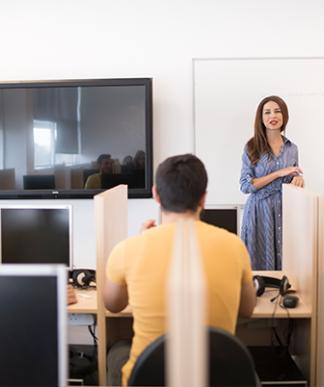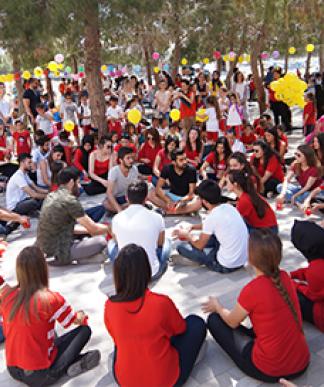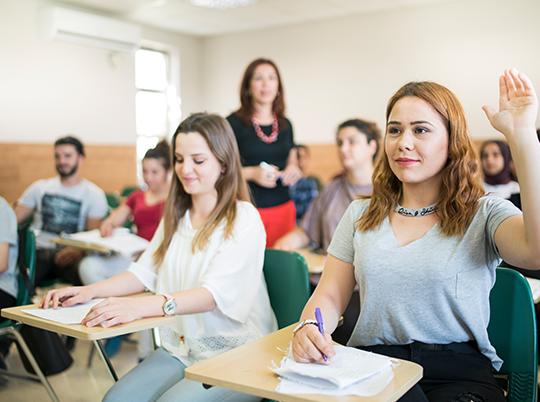


About the Program
The aim of this program is to train personnel who can assess the mental, linguistic, motor, social and emotional development and self-care capabilities of children and offer support to families, the child and the society to improve this development process. The program aims to train professionals knowledgeable in both typically developing and atypically developing children as well as children in need of protection, hospitalized children, immigrant children and child laborers. Schooling rates in preschool education are intended to be raised to 100% within the educational reform and it is predicted that the need for teacher assistants in sustaining preschool education will rise exponentially. In this program, it is preferred to train qualified child development personnel who improve themselves continually. Our students are educated in such a manner that they are expected to know all subfields of child development and be able to serve the people and institutions in the field.
Education Opportunities
A strong staff has been prepared for this program academically. Students who are in this program can plan, prepare and carry out the activities that are the most suitable for the developmental status of children; can communicate efficiently with children, parents and other partners; can use technology efficiently in their field; can implement educational strategies, methods and techniques suitable for the developmental status and individual differences of children. The students, through their 2-year education, are trained by lecturers who are competent in their fields and gain the knowledge and skills for their profession from the most reliable sources. The education in the clinic, practical courses and clinical practice will be carried out according to the principles and regulations of The Higher Education Council (YÖK).

Career Areas
Students who successfully complete the program get an associate degree diploma and acquire the title of “Child Development Member of Profession”. Students who graduate from this program can be employed in preschool educational institutions affiliated with the Ministry of Education, private education institutions, child clinics affiliated with the Ministry of Health or institutions affiliated with the Ministry of Family and Social Policies. Graduates from this program have a high chance to be employed due to the growing demand. Students, upon graduation, can continue their education in the undergraduate program on child development if they are successful in the DGS exam carried out by ÖSYM. The students can turn their associate degree into a bachelor’s degree by completing the undergraduate program and then, pursue postgraduate education in the Master’s and Ph.D. programs.
Contact
Vocational School of Health Sciences
Çevik Uraz Center, CU206
Tel: +90 392 671 1111 Extension: 2251
School E-mail: secretary-vhs@ciu.edu.tr
Director E-mail: aozada@ciu.edu.tr
Compulsory Courses
First Semester
HUMAN BIOLOGY
Course code
BIYO105Credit
2Theoretical
2Practical
0Ects
3INTRODUCTION TO CHILD DEVELOPMENT
Course code
CKGL103Credit
2Theoretical
2Practical
0Ects
3BASIC PHYSICS
Course code
FIZK103Credit
2Theoretical
2Practical
0Ects
3ELEMENTARY ENGLISH-I
Course code
INGL123Credit
3Theoretical
3Practical
0Ects
4INTRODUCTION TO PSYCHOLOGY
Course code
PSKO103Credit
3Theoretical
3Practical
0Ects
4SOCIOLOGY
Course code
SOSY101Credit
3Theoretical
3Practical
0Ects
5TURKISH LANGUAGE
Course code
TREG100Credit
0Theoretical
2Practical
0Ects
2UNIVERSITY ELECTIVE
Course code
UNISXX1Credit
3Theoretical
3Practical
0Ects
4Second Semester
BASIC ANATOMY
Course code
ANAT100Credit
2Theoretical
2Practical
0Ects
3BASIC COMPUTING
Course code
BILT110Credit
3Theoretical
3Practical
0Ects
4ALAN SEÇMELI
Course code
CKGLXX1Credit
2Theoretical
2Practical
0Ects
5BASIC PHYSIOLOGY
Course code
FIZY100Credit
2Theoretical
2Practical
0Ects
3ELEMENTARY ENGLISH-II
Course code
INGL124Credit
3Theoretical
3Practical
0Ects
4DEVELOPMENT IN EARLY CHILDHOOD
Course code
OOEG152Credit
2Theoretical
2Practical
0Ects
4DEVELOPMENT AND EDUCATION IN INFANCY STAGE
Course code
OOEG154Credit
2Theoretical
2Practical
0Ects
4DEVELOPMENTAL PSYCHOLOGY
Course code
PSKO126Credit
3Theoretical
3Practical
0Ects
3MODERN TURKISH HISTORY
Course code
TARH100Credit
0Theoretical
2Practical
0Ects
2Third Semester
SUMMER INTERNSHIP
Course code
CKGL200Credit
0Theoretical
0Practical
0Ects
5CHILD HEALTH AND DISEASE
Course code
CKGL203Credit
3Theoretical
3Practical
0Ects
3NEUROLOGICAL DEVELOPMENT
Course code
CKGL207Credit
2Theoretical
2Practical
0Ects
2FAMILY LIFE CYCLE AND INTRA-FAMILY RELATIONSHIPS
Course code
CKGL211Credit
2Theoretical
2Practical
0Ects
2AREA ELECTIVE
Course code
CKGLXX2Credit
2Theoretical
2Practical
0Ects
5CHILD MENTAL HEALTH
Course code
OOEG315Credit
2Theoretical
3Practical
0Ects
4SPECIAL EDUCATION
Course code
OZEG219Credit
3Theoretical
3Practical
0Ects
4UNIVERSITY ELECTIVE
Course code
UNISXX2Credit
3Theoretical
3Practical
0Ects
4Fourth Semester
VOCATIONAL PRACTICE
Course code
CKGL204Credit
10Theoretical
0Practical
20Ects
15AREA ELECTIVE
Course code
CKGLXX3Credit
2Theoretical
2Practical
0Ects
5AREA ELECTIVE
Course code
CKGLXX4Credit
2Theoretical
2Practical
0Ects
5FREE ELECTIVE
Course code
SSECXX1Credit
3Theoretical
3Practical
0Ects
6Elective Courses
FIRST AID
Course code
IAYM220Credit
2Theoretical
2Practical
0Ects
4TR Applicants
TR Students who are successful in the exams conducted by the Higher Education Council Student Selection and Placement Center (ÖSYM) and are entitled to enroll in our university in line with their preferences can complete the registration process with the necessary documents for registration from our Registration and Liaison Offices throughout Turkey or from the Marketing Directorate on campus.
Click for detailed admission requirements information.
TRNC Applicants
TRNC citizens and TR citizen candidate students who have completed their entire high school education in TRNC. They are placed in undergraduate programs in line with their success in the CIU Student Placement and Scholarship Ranking Exam and the programs they prefer.
Students who are successful in the exam can register from the TRNC Marketing Office.
Tuition Fees are determined at the beginning of each academic year. Candidate students who are entitled to enroll in CIU can learn their fees in line with the Tuition Fee Calculation system.